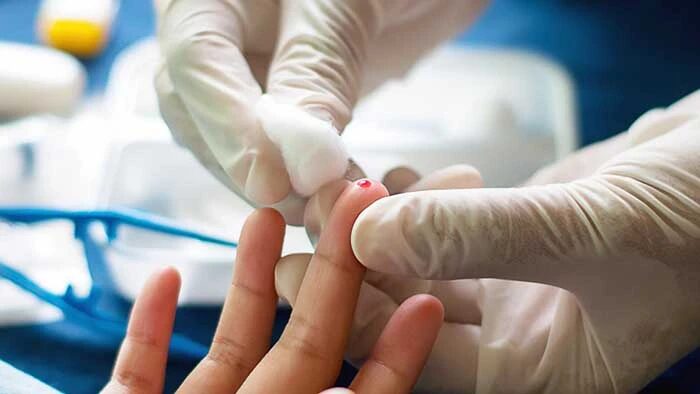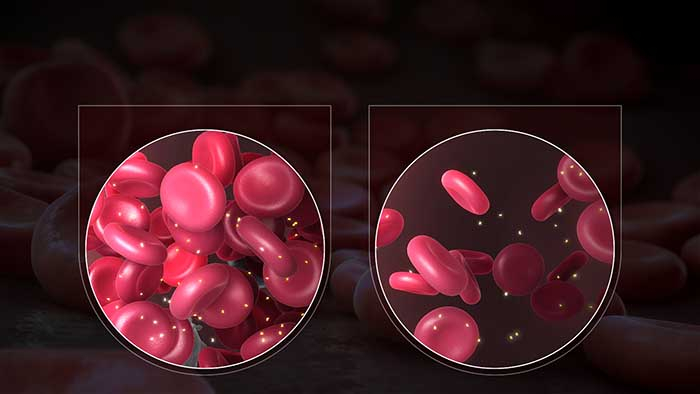Iron is an essential mineral that is critical for maintaining good health. When there is insufficient iron in the body, it leads to a condition called iron deficiency. Iron deficiency results in a decrease in the number of red blood cells and affects the production of hemoglobin, a protein that helps red blood cells carry oxygen throughout the body. This can lead to a lack of oxygen in the entire body and cause anemia.
Common causes of iron deficiency include inadequate iron intake from a poor diet or excessive dieting, inflammatory bowel disease, increased iron needs during pregnancy, excessive bleeding during menstruation, and internal bleeding.
Symptoms of iron deficiency include fatigue, difficulty concentrating, memory problems, reduced ability to exercise, hair loss, and brittle nails.
Diagnosis of iron deficiency can be made based on symptoms, as well as through a blood test to check the level of hemoglobin. Treatment typically involves making dietary changes and taking iron supplements.
What are the signs and symptoms of iron deficiency?
Initially, the symptoms of iron deficiency are so mild that you may not recognize them. But as the deficiency increases and anemia becomes severe, the symptoms intensify. Signs and symptoms of iron deficiency include:
- Swelling, redness, burning, or pain in the tongue
- Brittle nails
- An unusual desire to eat non-nutritional substances, such as snow or dirt.
- Loss of appetite, especially in infants and children.
- Headache, dizziness, or vertigo
- Feeling weak
- Cold hands and feet
- Feeling extremely tired
- Yellowing of the skin
- Chest pain, fast heartbeat, or shortness of breath.
When should you see a doctor?

If you experience one or more of the symptoms above for more than a few weeks, inform your doctor. Your doctor will examine you to determine if the symptoms are due to iron deficiency or another cause. Seeking medical advice is crucial if you have iron deficiency.
Why does iron deficiency occur?
Causes of iron deficiency include:
- Part of your intestine being removed or bypassed, affecting your ability to absorb iron and other nutrients.
- Iron deficiency can occur in pregnancy, as many women become deficient without supplementation, as they need more iron for themselves and for the fetus.
- Slow bleeding inside the body, caused by stomach ulcers, hernia, colon cancer, etc.
- Some pain relievers can cause stomach bleeding.
- Eating a diet that contains too little iron.
- Losing a lot of blood, which leads to iron loss.
- Women who have heavy periods may also be iron deficient, as they lose a lot of blood.
- Inability to absorb iron, caused by intestinal disorders such as celiac disease.
Iron Deficiency Anemia
Iron deficiency anemia occurs when the body lacks enough iron to produce hemoglobin. Hemoglobin is a component of red blood cells that gives blood its color and helps red blood cells transport oxygen throughout the body.
If you don’t consume enough iron or excrete too much iron, your body will not be able to produce enough hemoglobin, leading to anemia.
Who is at risk of iron deficiency?
- Women: Women are at a higher risk of iron deficiency due to bleeding during menstruation.
- Frequent Blood Donors: People who donate blood frequently may also be at a higher risk as this can deplete the iron in their bodies. However, this can be corrected by consuming iron-rich foods.
- Vegetarians: People who don’t eat meat or consume iron-rich foods are more susceptible to iron deficiency.
- Infants and Children: Infants, especially low birth weight, premature or those not getting enough iron from breast milk or formula, are at a high risk of iron deficiency. Children require extra iron as they grow, so if they don’t eat a variety of healthy foods, they may be more prone to iron deficiency.
How to prevent iron deficiency?
The best way to prevent iron deficiency is to eat an iron-rich diet regularly.
Mothers should give their babies breast milk or fortified infant formula. Cow’s milk should not be given until the baby is one year old as they cannot digest it.
What Foods Are Highest in Iron?
- Vegetarian foods: Gourd and pumpkin seeds, capsicum, green leafy vegetables (such as spinach), baked potatoes, kidney beans and other beans, raisins, and other dried fruits.
- Non-vegetarian foods: Meat, chicken, eggs, seafood.
- Supplements: If you need iron supplements, they should be taken under a doctor’s supervision, as regular blood tests may be required to measure the iron levels in the blood.
How is iron deficiency diagnosed?

To diagnose iron deficiency, a doctor will take a patient’s medical history and ask about symptoms they are experiencing. The doctor will also consider the patient’s dietary habits and any recent history of excessive bleeding.
Diagnosis is made through blood tests, including:
- Complete Blood Count (CBC): This is the first test commonly used by doctors to check the levels of all components in the blood, including the size of red blood cells.
- Tests for Internal Bleeding: If the doctor suspects internal bleeding, they may perform additional tests, such as a “fecal occult test” to check for blood in the stool, or an endoscopy to examine the inner lining of the stomach.
- Other Tests: Anemia or iron deficiency is usually diagnosed by the CBC test. The doctor may also order other blood tests to determine the severity of the anemia, including tests to check iron levels, the color of red blood cells, ferritin levels (a protein that helps the body store iron), and Total Iron Binding Capacity (TIBC) which measures the amount of transferrin carrying iron.
How can I raise my iron level?
Treatment for iron deficiency begins only after testing for the deficiency and identifying its cause. In most cases, iron deficiency is treated with iron therapy and treatment for the underlying cause to prevent the recurrence of the deficiency.
Iron Supplements:
The doctor may recommend iron tablets to replenish the iron in your body and determine the correct dosage for you. Iron supplements also come in syrup form for young children and infants. To increase the chances of your body absorbing the iron, the doctor may instruct you to:
- Take the iron tablet with Vitamin C, as Vitamin C enhances iron absorption. This is why the doctor may ask you to take the iron tablet with a glass of orange juice or a Vitamin C supplement.
- If possible, take the iron tablet on an empty stomach. However, taking the tablet on an empty stomach may cause stomach discomfort. If this occurs, take the tablet with a meal.
- Do not take iron tablets with antacids, as they can interfere with iron absorption. Therefore, try to take the iron tablet 2 to 4 hours before taking these medications.
- Iron supplements can cause constipation, for which the doctor may prescribe stool softeners. Iron can cause stools to turn black, but this is a harmless side effect.
You may need to take iron supplements for a few months or longer to replenish your body’s iron. You typically start feeling better within a week of starting treatment. You may need to take iron supplements for a year or longer to ensure your iron intake is met.
If iron deficiency anemia is severe, intravenous iron or blood may be given to supplement iron and hemoglobin.
If iron supplements do not increase your blood iron levels, it may be due to internal bleeding or a problem with iron absorption. The doctor will examine the condition thoroughly and prescribe the appropriate treatment, which may include:
- Medicines, such as the contraceptive pill, to reduce heavy menstrual bleeding
- Antibiotics and other medicines to treat stomach ulcers.
- Surgery to treat tumors or fibroids that cause bleeding, etc.
Anemia caused by Bleeding or Blood Loss
If you have experienced a sudden loss of blood, treatment may include fluid replacement, blood transfusions, oxygen supplementation, and possibly iron supplementation. This helps to stimulate the production of new red blood cells in the blood. Chronic anemia is addressed by identifying the source and cause of bleeding, stopping the bleeding, and treating iron-deficiency anemia if necessary.
What are the diseases caused by iron deficiency?
Iron deficiency rarely causes serious or long-term problems. However, some individuals who are iron deficient find that it affects their daily lives. Here are some common complications and diseases caused by iron deficiency:
Heart and lung complications – Adults with severe anemia are at a higher risk of developing complications affecting the heart and lungs, such as tachycardia (abnormally rapid heartbeat) or heart failure (when the heart cannot pump enough blood around the body).
Fatigue – Iron deficiency can cause fatigue and make you feel very tired. Additionally, it can also reduce your energy levels, leading to difficulties in performing daily tasks, decreased ability to stay awake and pay attention, and decreased ability to exercise regularly.
Pregnancy – Pregnant women with severe anemia are at increased risk of developing complications, especially during or after birth. Babies born to women with severe anemia are more likely to experience preterm birth (before 37 weeks of pregnancy), have low birth weight, have iron deficiency, and have poor performance on mental ability tests.
Immune system – Iron deficiency can also impact your immunity, making you more susceptible to illness or infection.

